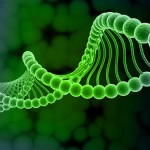 What if scientists could predict whether your body would respond well to a particular diet or weight loss treatment – would you be more likely to try it? Most of us would answer with a resounding “Yes!” It may seem unlikely, but the findings of two new studies suggest that we may be closer to pinpointing in advance which treatments will help individuals lose weight, based on genetics.
What if scientists could predict whether your body would respond well to a particular diet or weight loss treatment – would you be more likely to try it? Most of us would answer with a resounding “Yes!” It may seem unlikely, but the findings of two new studies suggest that we may be closer to pinpointing in advance which treatments will help individuals lose weight, based on genetics.
The first study, published in the FASEB Journal, found that there are five epigenetic biomarkers in teens that can be linked with a better weight loss at the beginning of a weight loss program. This finding could lead to the ability to predict an individual’s response to weight loss intervention, and may offer therapeutic targets for enhancing a weight loss program’s effects, as well. Being able to treat obesity during adolescence could reduce morbidity at later stages of life and lead to a better quality of life. “If you’ve ever wondered why some people seem to do so well on a diet and exercise plan and other fail so miserably, then now we know that the way that genes express themselves (via epigenetics) plays an important role,” said Gerald Weissmann, M.D., Editor-in-Chief of The FASEB Journal. “This study moves us a step closer when we will be able to prescribe a weight loss program tailored to more than just the lifestyle and conditioning level of the patient, but also to his or her particular genetic and epigenetic profile,” he concluded.
The second study, conducted by researchers at Massachusetts General Hospital, found that there is a gene variant that can be used to predict how much weight a patient will lose after gastric bypass surgery. This new research is exciting because it’s the first study to identify genetic predictors of weight loss after bariatric surgery, and has the potential to guide treatment planning and to facilitate the development of new therapeutic approaches to treating obesity.
To identify the gene variant, the research team conducted genome-wide association studies of more than 1,000 patients who underwent gastric bypass at Mass General from 2000 to 2011. They analyzed nearly 2 million gene sites for links between specific variants and weight loss after surgery. They found that one specific variant at a site on chromosome 15 was most closely associated with weight loss. Individuals with two copies of the beneficial version of the gene lost an average of almost 40 percent of their pre-surgical weight, while those with only one copy lost only around 33 percent, the study reported. Just one person in the study group had no copies of the beneficial variant, and lost less than 30 percent of his pre-surgical weight. Of note, none of the predictive gene sites identified in this study is involved in pathways previously found to influence the development of obesity, suggesting that different genes contribute to the benefits of gastric bypass.
We spoke with San Diego weight loss surgeon, Dr. Sunil Bhoyrul, about the implications of this research. He said, “Genomics is clearly the X factor in helping us decide the best type of weight loss intervention for any given patient. The ability to influence the choices of diet and surgery are evident in the studies featured in this article. Our challenge is to incorporate “probabilistic” rather than deterministic data into clinical care. Its relevance is maximized when used in conjunction with multiple data points (such as multiple genes tested and phenotypic data such as body composition and personality traits). To use this successfully is to completely rethink the way in which we collect and assimilate data for every individual patient. Are we ready?”
Related Reading: Gastric Bypass Surgery Changes Metabolism and Genes






Weight Loss Studies & Clinical